Film of the Week: Widows

Steve McQueen’s Widows has all the elements of a superb, socially rooted crime thriller. It has a tight, no-nonsense premise; a prestigious cast all pretty much at the top of their game; elegant, sometimes inspired visual execution; dialogue that can have a spring-loaded snap to it; and a firm grounding in present-day tensions, sexual, racial, and political. It’s a film that gestures at brilliance—but ultimately falls short of it, because the overall picture never quite gels into something you can totally believe in. It’s a dazzling film, but an immensely frustrating one.
McQueen’s Oscar-winning 12 Years a Slave puzzled many because it showed how far the British director had come from his past—both as a gallery moving image artist and as the maker of the detached, stylized Hunger (2008) and Shame (2011). Now Widows surprises because it’s a sleek, taut, mainstream drama, and yet one that altogether bears the imprint of McQueen the artist, slyly inflecting the stylistic tropes of the American thriller.
Written by McQueen and Gillian Flynn—the novelist and screenwriter of Gone Girl and TV’s Sharp Objects—the film is a reworking of the early 1980s British TV series Widows, created by Lynda LaPlante, a specialist in female-based crime dramas (among them Prime Suspect). The premise of Widows, boiled down to its simplest, is this: when an entire criminal gang is killed during an armed robbery, their widows decide to pull off a job themselves.
McQueen and Flynn transplant the story from London to Chicago, where Veronica Rawlins (Viola Davis) has been living with career criminal husband Harry (Liam Neeson) in luxury, and in mutually passionate contentedness, despite a tragic backstory involving their son. The film opens on the couple in bed, sharing a hot kiss; it’s still enough of an anomaly in U.S. mainstream film to see this between a black woman and a white man, both middle-aged and real-looking rather than glamorous, that this simple image feels like a hardcore statement of intent.
The kiss turns to a sexy, snapping lip-bite and—bam! we cut to Harry’s last heist in full brutal swing. And brutal is often the word for editor Joe Walker’s vital, staccato cutting, often jumping from one short scene to another with nervy vigor. The heist is going wrong. We’re looking out of a speeding van, through a back door that’s hanging loose; cars crash, sparks gush and before long the gang’s escape is foiled by a SWAT team and walls of flame. Here’s a film that comes on like a tempest, then leaves us with flickers of distant lightning and rumbles of thunder over the course of a long, teasing build-up.
Things fall into place, fragment by fragment. Flashbacks introduce us to other gang widows: Linda (Michelle Rodriguez), who owns a clothing store, but whose husband has been gambling away her money; and Alice (Elizabeth Debicki), first seen with a black eye in the company of a muscle man who’s all kissy-kissy right now, but who could clearly lash out in a split second (a concise, impeccably judged scene). Then we meet assorted male heavies. Colin Farrell is in wonderfully anxious form as politician Jack Mulligan, scion of a long-established Irish family whose power lies in a tradition of nepotism and corruption; his father Tom (Robert Duvall, superb as a feral old dinosaur of a racist patriarch) continues to pull Jack’s strings, mercilessly infantilizing him.

Then there’s the African-American opposition: Jamal Manning (Brian Tyree Henry), who’s standing for alderman in Chicago’s 18th ward, and who we briefly think is going to be the good guy, but who proves as mercilessly self-serving as anyone here. His brother Jatemme (Daniel Kaluuya) is a ruthless executioner who makes a pair of hapless victims display their rapping and rhythm-boxing skills—Sean Bobbitt’s camera circling round them in a nerve-racking if somewhat cold-blooded set piece—before carrying out summary execution.
Things, meanwhile, are getting nasty for the now financially challenged widows. Linda’s shop is being repossessed, and her mother-in-law coldly cuts her out of her life, blaming her son’s death entirely on her in a terrific brief scene where the chilly blast of reality really cuts hard. Alice, ruefully used to relying on her beauty and sexuality, is persuaded by her mother (Jacki Weaver, excellent as ever and intensely creepy) to join a website for meeting “generous” men. Then Veronica receives a visit from the smoothly menacing Jamal, who tells her that Harry stole $2 million of his campaign funds, which have now gone up in flames, and that she has one month to pay him back.
Deus ex machina time. Harry has left Linda a notebook, detailing the plans for a very lucrative theft. She tries to sell the book, then decides to carry out the job herself. All she needs is accomplices. Once she’s imperiously summoned them to two meetings—one in a luxury sauna, the other in Harry’s warehouse hideout—Linda and Alice are in. And once they’re in, even though time is ticking, things fall into place remarkably smoothly. So they don’t know exactly where the site is that’s detailed in Harry’s plan? Alice is dating a man in building finance, who can identify it. Need the codes to crack the security? Harry has left compromising pictures of the man who can provide them. Still lacking a driver? Fortunately, there’s Belle (Cynthia Erivo, so explosively good in Bad Times at the El Royale, and largely wasted here), a hairdresser who doubles as Linda’s babysitter; not only can she drive, she also excels at running fast and doing highly gymnastic surveillance duty (plus she has a great bleached crop).
You feel churlish complaining that some of this feels a bit facile. Rooted as it is in acutely sketched social and political realities—race, economics, gender violence, corruption—Widows feels as if it’s padded with solid proof against accusations of ludicrousness. But it’s not that easy to get around the film’s premise: innocent amateurs miraculously turning into hard-nosed operators overnight. The film, like the original show, dares you to get sniffy about the idea of a group of women pulling off a daring heist: that’s the whole point of Widows, as expressed in such lines as Veronica’s instantly tweetable “No one thinks we have the balls to pull this off.”
The obvious objections to the film’s logic aren’t about balls, literal or figurative, but about simple plausibility and timing. Harry spent ages working out this one complex job, but the widows are going to pull it off practically overnight: Veronica tells her accomplices that they have three days to learn to operate “like a team of men.” That makes the job seem like a challenge on a TV reality show; the difference is that a horrible fate awaits if the contestants screw up.
The script gives us everything we need to understand how intolerable are the pressures facing the women—to make us accept that the going has got so tough that they have no choice but to get tough and get going. Yet it takes a little more to persuade us that they can find their inner criminal on the spot. A TV series has time to let these changes evolve: here, Veronica puts her team through brisk boot camp (OK, now try carrying a heavier moneybag) and snarls at them for motivation, in a way you sort of believe because that’s Viola Davis behind the snarl. But by the time they’re kitted up in protective gear and using voice scramblers and Tasers as if to the manner born, you think… really? To paraphrase Peggy Lee, is that all there is to breaking bad?
There are some other clumsy touches: that old chestnut, the code that doesn’t work at first because it’s all 6s and 8s and 1s and turned out to be upside down (d’oh!), and the glamorous but barely believable image of Veronica on her back aiming upwards at an assailant as if she’d just remembered how cool that pose looked in Reservoir Dogs. In the film’s second half, after all the careful psychological groundwork has been set, people start behaving in a way that flouts recognizable behavior just as Marvel movies flout the laws of gravity. By this time, however, we’ve already had the surprise twist, which is so hard to swallow that the film’s narrative logic just feels utterly untrustworthy thereafter. It’s as if the film has thrown away its own ground rules, and suddenly swapped a complex Richard Price novel for a wham-bam airport read.
At its best, however, Widows operates on a very distinguished level indeed. It’s good at leaving gaps and uncertainties, so that for quite a while we’re at a loss to knowing what the deal is with Amanda (Carrie Coon), a fourth woman who declines the sauna invitation; or exactly what the relationship is between Jack and his smiling, almost silent assistant Siobhan (Molly Kunz). One of the film’s great scenes takes place between them. He’s speaking at a meeting of a local organization he backs, where he’s accosted—or should that be Acosta’d?—by an investigative journalist who won’t take “shut up” for an answer. He and Siobhan get into a limo and drive off—and we only hear their subsequent conversation, in which she tells him to “man the fuck up,” because it takes place entirely behind the car’s dark windshield in a long take.
There are some thriller sequences that any straight-down-the-line genre practitioner would die for: like a terrifying scene in which Jatemme makes some horribly casual knife thrusts at a man he’s knocked out of his wheelchair (Kevin J. O’Connor, always welcome); and another in which a character gets noisily roughed up off-screen, while Jatemme settles down to watch TV. But you can’t help feeling at times that the film has invested more passion and ingenuity in fleshing out the horrible ways that men behave than in fully working through the characters of its heroines. The most believable story belongs to put-upon Alice, whose sense of injustice comes slowly but unfailingly into play as her new boyfriend (a nicely snaky Lukas Haas) reveals his true colors; there’s also a poignant, unnerving moment between Linda and a recently bereaved man, in which Michelle Rodriguez takes her acting to an emotional level she probably hasn’t had to attain since her debut in Karyn Kusama’s Girlfight (2000).

As for Davis, she’s often called upon to be ferocious and magnificent—which she does with imperious style, although for my money, she did it to rather more unsettling and complex effect in the wonderfully intricate TV series How to Get Away with Murder (the first season, at least: I can’t speak for the rest). Her Veronica seems most fully limned here when she’s vulnerable, which is significant: not that the film is necessarily more comfortable with women’s vulnerability than their strength, but that human beings tend to seem more human onscreen when struggling with their fears and weaknesses, rather than when they’re strapping on guns and preparing to kick ass. Hence some scenes of marital grief that may be on the nose and by the book, but that move you nonetheless: Veronica reaching out to an empty half of the bed, an imagined return of Harry so Ghost-like that you start looking around for the potter’s wheel.
As for style, though, Widows has it in abundance, in a way that shows the touch of McQueen the gallery artist: some fiendish positioning of mirrors in a diner scene; a moment when Alice gets slapped by her mother, and her head bobs out of alignment with the frame, and freezes there, motionless. There’s also a wonderful moment when Veronica steps out of a bowling alley with red and white frontage that resembles a painted surface in a work by Ed Ruscha.
There’s so much that’s good in Widows as a film that it seems churlish to complain that it doesn’t really work either as a character piece or as a straight thriller. It’s on that cusp of genre piece and art movie so brilliantly balanced by, say, A Most Violent Year and Killing Them Softly and, in its time, Point Blank, which this film’s teasing dislocation and sense of urban space rather reminded me of. I’m skeptical about McQueen totally pulling it off as a mainstream filmmaker; but it’s good to see McQueen the artist showing his hand while he tries it.
Jonathan Romney is a contributing editor to Film Comment and writes its Film of the Week column. He is a member of the London Film Critics Circle.







